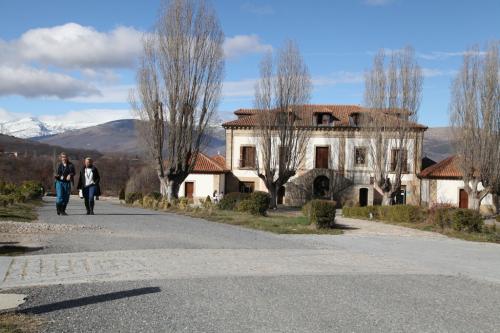Lost in translation? Adventures in another language
Even at 83, there are still things to learn. Every morning Peter McMurdie tries his hand at Spanish in the quaint little town of El Barco de Ávila, 200 kilometres west of Madrid. “It’s an exciting and very rewarding experience,” explains the former BBC engineer from London. “I can understand Spanish quite well and I love learning foreign languages.” Like many, he is discovering that acquiring a language is the key to discovering a new culture.

Many language enthusiasts go to El Barco de Ávila to improve their Spanish.
Mr McMurdie is one of the volunteers helping students taking part in a language immersion programme in this town on the banks of the River Tormes, dominated by the Sierra de Gredos Mountain Range. The vaulting of its slender Romanesque church and the stone arcades of its small but charming main square provide the setting for people exploring the language. Susan Greenwood, a professor of business administration from Manchester, praised the difference just one week could make: "Sometimes I feel like I'm living in a parallel world in which a new mixed identity is created, a genuine European personality."
Often learning the language is only the beginning. Some 2.4 million people from other EU countries live in Spain, attracted by its warm climate and friendly people. Thanks to freedom of movement in the EU, it has become much easier to live and work in another country. They also benefit from the EU’s reciprocal healthcare arrangements whereby national health services reclaim the costs of treatment from each other, not the patient. Those who decide to retire in Spain are still entitled to receive the pension from their own country.
Simon Harding, a teacher now working near Malaga, is one of the people to have made the move. He arrived in Spain in 1990, at a time when the country started to modernise thanks to EU funding. “As a language graduate, my aim was always to become integrated in Spanish society: that is why I came to Spain to live. I pride myself in knowing not only the language, but also the history, geography and general culture of the country,” the Brit said.
However, Spanish people are also making use of the opportunities offered by the EU. Spanish students represent the biggest beneficiaries of the EU’s Erasmus scheme, which has enabled more than three million students to study in another part of the EU.
Amelia Cerdan, from Lille in France, is studying journalism studies in Madrid as part of her Erasmus. “Spain is a very attractive destination, not only for students," she said. Cerdan praised the opportunities offered by Erasmus: “This is certainly the greatest experience of my life, I recommend it to everyone. I feel lucky to have this opportunity. It is great to meet people from everywhere in Europe.”
Whilst Spain is the top choice for Erasmus students, Spanish students mostly choose to study in Italy, the UK, Germany and France. From 2014-2020, an extended Erasmus+ will be funded to the tune of €14.7 billion, allowing a further four million young people up to age 30 to study, train, teach and undertake apprenticeships.
Source: European Parliament
- 397 reads
Human Rights
Fostering a More Humane World: The 28th Eurasian Economic Summi

Conscience, Hope, and Action: Keys to Global Peace and Sustainability

Ringing FOWPAL’s Peace Bell for the World:Nobel Peace Prize Laureates’ Visions and Actions

Protecting the World’s Cultural Diversity for a Sustainable Future

Puppet Show I International Friendship Day 2020

